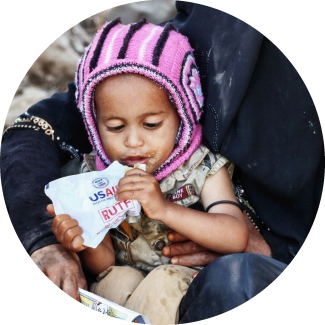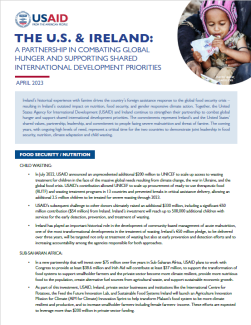Ireland’s historical experience with famine drives the country’s foreign assistance response to the global food security crisis – resulting in Ireland’s outsized impact on nutrition, food security, and gender responsive climate action. Together, the United States Agency for International Development (USAID) and Ireland continue to strengthen their partnership to combat global hunger and support shared international development priorities. The commitments represent Ireland’s and the United States’ shared values, partnership, leadership, and commitment to people facing severe malnutrition and threat of famine. The coming years, with ongoing high levels of need, represent a critical time for the two countries to demonstrate joint leadership in food security, nutrition, climate adaptation and child wasting.
Food Security/Nutrition
Child Wasting:
- In July 2022, USAID announced an unprecedented additional $200 million to UNICEF to scale up access to wasting treatment for children in the face of the massive global needs resulting from climate change, the war in Ukraine, and the global food crisis. USAID’s contribution allowed UNICEF to scale up procurement of ready-to-use therapeutic food (RUTF) and wasting treatment programs in 13 countries and prevented breaks in critical assistance delivery, allowing an additional 2.5 million children to be treated for severe wasting through 2023.
- USAID’s subsequent challenge to other donors ultimately raised an additional $330 million, including a significant €50 million contribution ($54 million) from Ireland. Ireland's investment will reach up to 500,000 additional children with services for the early detection, prevention, and treatment of wasting.
- Ireland has played an important historical role in the development of community-based management of acute malnutrition, one of the most transformational developments in the treatment of wasting. Ireland’s €50 million pledge, to be delivered over three years, will be targeted not only at treatment of wasting but also at early prevention and detection efforts and to increasing accountability among the agencies responsible for both approaches.
Sub-Saharan Africa
- In a new partnership that will invest over $75 million over five years in Sub-Saharan Africa, USAID plans to work with Congress to provide at least $38.6 million and Irish Aid will contribute at least $37 million, to support the transformation of food systems to support smallholder farmers and the private sector become more climate resilient, provide more nutritious food to the population, create alternative fuel sources from agricultural waste, and support sustainable economic growth.
- As part of this investment, USAID, Ireland, private sector businesses and institutions like the International Centre for Potatoes, the Feed the Future Innovation Lab, and Sustainable Food Systems Ireland will launch an Agriculture Innovation Mission for Climate (AIM for Climate) Innovation Sprint to help transform Malawi’s food system to be more climate resilient and productive, and to increase smallholder farmers-including female farmers- income. These efforts are expected to leverage more than $200 million in private-sector funding.
Climate Change & Adaptation
USAID is also expanding its partnership with Ireland to safeguard nutritional gains against the impacts of climate change, while also helping frontline communities, and in particular women, build resilience against the impacts of climate change.
Locally Led Adaptation (LLA):
- The impact of climate change is already destroying people’s lives and livelihoods, and USAID and Irish AID are committed to ensuring adaptation finance reaches those most often left behind. Irish Aid was the first donor government to endorse the Principles for Locally Led Adaptation, an initiative that encourages empowerment of local communities to adapt to climate change and better practices by donors to support local efforts. USAID endorsed the principles in 2021 and is working to integrate those principles into our own international climate action and funding. Together, the United States and Ireland call on other climate and development donors to endorse these principles by COP28 and join this collective effort to ensure that adaptation is effectively resourced and delivered to reach populations most vulnerable to climate impacts.
Climate & Gender:
- The U.S. and Ireland both recognize the disproportionate impact on women from the dual climate and food security crises. Together, the United States and Ireland are committed to advancing gender responsive climate action and food systems transformation.
Peace and Human Rights
International Fund for Ireland (IFI):
- With USAID’s decades-long support, along with that of other donors, the IFI has been successful in nurturing in Northern Ireland a culture of grass-roots, community-led approaches toward peacebuilding and reconciliation that is now a model for other conflict zones around the world.
- Since the inception of the program in 1986, the United States has contributed $552,748 million.
Ukrainian Refugees:
- The generosity of the Irish people is also reflected in the country’s openness to those who are fleeing the violence in Ukraine. To date Ireland has accepted 80,000 refugees, approximately 1.5% of the population.


